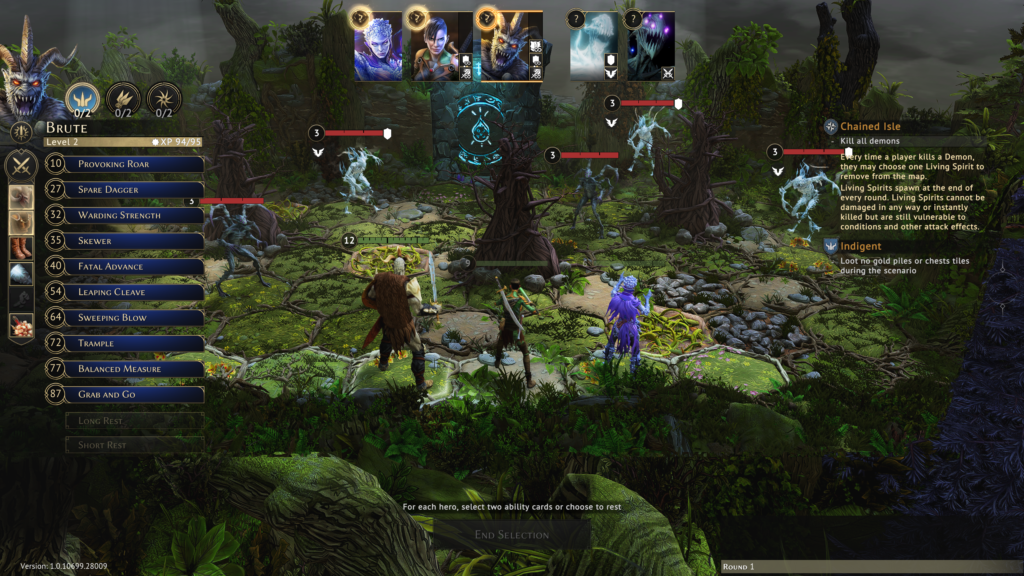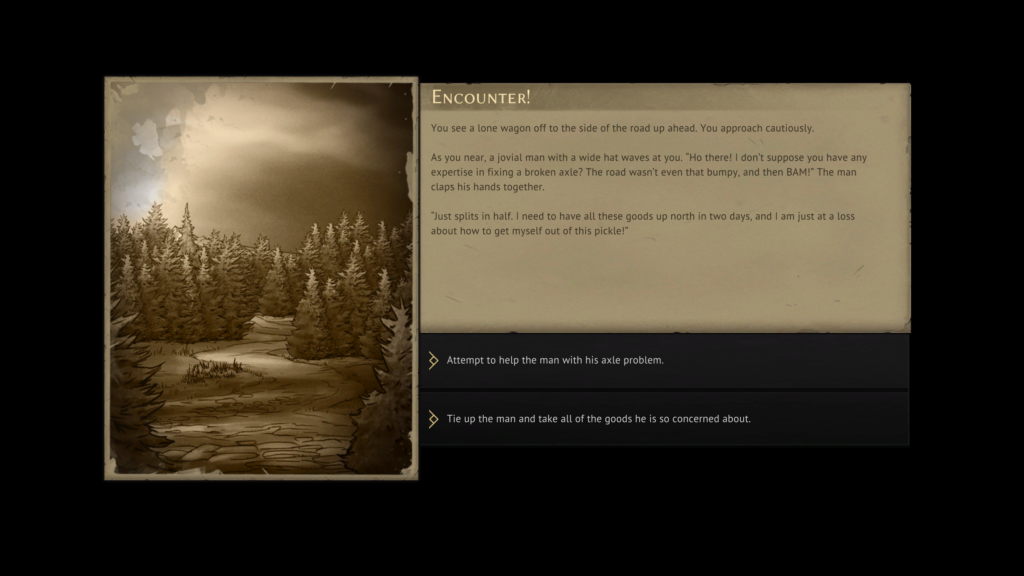
I’ve stopped regularly playing boardgames a long time ago, yet I still experienced a touch of big box envy when I read about the Kickstarter for this project and all of the miniatures it contained. So when I saw the digital adaptation available for free on Epic, I naturally snagged it as quickly as possible. It really is a complete and faithful adaptation of the original boardgame and therefore includes an insane amount of content. In real-life playing through a full campaign might take months and even playing alone on this digital version might take over 100 hours. Alas after learning the rules and finishing several scenarios, I’ve discovered that this is too hefty a commitment for me. Even at a lowered difficulty level, this is tuned to be hard enough to require near optimal decision-making. I’m grateful to have been able to finally try this game out for nothing more than the cost of my own time but this is too stressful to me to be much fun.
This adaptation includes voice-acting and some nice background art for the flavor text that accompanies each scenario. I’ve found however that the story is so generic that it doesn’t matter. You control a group of two to four mercenaries based out of the city of Gloomhaven and you venture out to complete quests. Completing a scenario will unlock one or more new ones and while there are story threads connecting them, every scenario is a dungeon run and as I tend to pick which dungeon to do next based on how hard they are, I quickly stopped caring about the story. The world eschews the traditional fantasy races for more exotic ones but as the world itself is still generically fantasy, I found that stylistic choice to be mostly a detriment to quickly getting to grips with the game. While travelling to the quest location, you also get random encounters and I’ve learned to dread them as they’re usually bad, giving you some kind of malus while doing the quest or start with your party having already taken some damage. I know that as this was originally a boardgame, it’s all implemented by drawing cards and that limits the complexity of the scripting that is possible. The upshot is that the story feels too disconnected to matter and you’ll soon boil everything purely down to in-game effects.

The meat of a boardgame is of course is its mechanics and I have to admit the rules here are pretty neat. Each character is defined by hand of cards of fixed size that you may assemble out of a collection of unlocked cards. Each round you select two cards to play. This determines your initiative for the round and your available actions. During your turn, you select the top half of one card to take effect and the bottom half of the other card. Typically the top half represents attack effects and the bottom half movement abilities. There are also default weak attack and movement effects available. Combat proceeds like any other RPG except that you can sacrifice, or burn, cards to absorb damage. When you exhaust your hand you take a rest action to refresh your cards but must burn a card to do so. Certain powerful effects also burn the card similarly. In this way, the limited pool of cards imposes a strict resource constraint. You’re constantly under time pressure as you must select two cards every round. You must also strike a balance between doing enough damage to kill monsters and moving around the map quickly enough to accomplish the scenario’s objectives.
There’s still some randomness as both the actions of enemies and the final damage from attacks are determined or modified by drawing cards. I find that scenarios can be won at normal difficulty but it requires optimizing the cards and items you bring and knowing what you will be facing in that dungeon. One of more frustrating rules is that even looting is an action and it may be tough to grab the treasure chest that is available before your characters are all exhausted. Without knowing details like the special rules for each scenario, its layout and the enemy composition in it, I typically find that I will fail the first time I attempt it. Once forewarned, it gets much easier. It also gets easier as your characters make some progress. It’s not just about raw power, it’s about getting more options to deal with different problems. Also, the perk system lets you improve the deck of attack modifier cards without the characters necessarily gaining levels at all. It’s even possible to grind scenarios for incremental character gains without being able to beat them.

Even with the tiny bit of progress I’ve made in the game, it’s easy to see why it has its fans. Every tiny little decision matters, every bit of optimization is important. You’re not just thinking what are the best actions to take this round, you need to think about how actions now close off or open up opportunities for future rounds. As you gain more experience with the game, it gets easier as you become more familiar with what each character can do, what the different monster types can do and get a better feel for how your resources should be parceled out over the course of a scenario. At the beginning however, it feels overwhelming how much analysis is required and the first couple of scenarios at least is considered by many players to be brutally difficult. Character advancement feels a little slow in this game but when it happens, it feels very satisfying. Unlocking new cards, buying new gear, enhancing your cards and so on, getting perks all make a tremendous difference to your effectiveness. The intent is to reenact at least the crunch combat portion of a pencil-and-paper RPG campaign over the course of many sessions and in this I suppose it succeeds brilliantly.
From my limited experience, I notice that the scenarios do throw new and interesting challenges at you as you advance so it’s never a cakewalk. It’s not just about bigger numbers. It’s inefficient to slowly whittle down shielded enemies so you need to bring specific tools for them. Obviously you’d prefer not to fight enemies with retaliation abilities in melee and so on. There are also bosses with scary health pools, immunity to all kinds of afflictions and whose every attack is area of effect. The new cards your characters get are amazing too but from what I can tell the enemies are designed to keep surprising you throughout the entire campaign.

Like several other heavy games, I could see myself spending serious time on this and working my way through as many scenarios as I can. I haven’t even unlocked any of the more advanced classes and I’m sure that there are obtainable items later that will shock me. But this game is just too time consuming and takes too much concentration to me to attempt to complete. I’ve also found that I very much prefer the design paradigm of videogame RPGs. No doubt this game’s design is great for tabletop playing with a group of people. With other people involved, even if you ultimately lose a scenario, no doubt you’d still have a memorable and fun session. If you do win by the skin of your teeth, it would feel even more exhilarating. For me by myself, I kind of do want a story in an RPG and I want to be able to consistently win without it being too stressful. So I’m dropping this and moving on to other games.